Iranian lawmaker says government barred from direct talks with the US
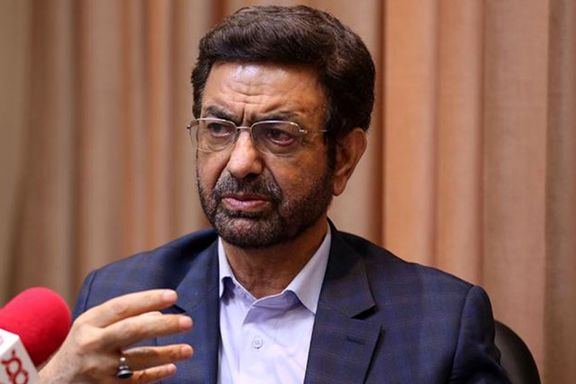
A member of Iran’s parliamentary national security and foreign policy committee says the government is not currently permitted to engage in direct negotiations with the US.

A member of Iran’s parliamentary national security and foreign policy committee says the government is not currently permitted to engage in direct negotiations with the US.
"The government has only been authorized to negotiate with European countries," Fada-Hossein Maleki said in an interview with the Didban Iran website in Tehran published Sunday.
"Iran is not the first, second, or even third priority for [Donald] Trump," Maleki added, the two countries not having diplomatic ties since 1980.
Maleki also highlighted that Iran has never entirely closed the door to negotiations in recent years.
"Some mediating countries, like Oman, have consistently maintained contact with both the Iranian side and Western parties, including the Americans," he said.
He emphasized that the Islamic Republic has always kept the path to dialogue open to demonstrate its adherence to international principles and norms, blaming the US for violating commitments by withdrawing from the JCPOA.

A member of Iran's Assembly of Experts has condemned the idea of potential talks with the US, stressing that resistance against Washington is a core principle of the Islamic Republic.
"Like Gaza, we too must resist the US," Ahmad Khatami, who also serves as Tehran's interim Friday prayer leader, said on Saturday while speaking at a mosque in Kashan, central Iran.
"I am confident that as long as the people stand firm, they will take the dream of negotiating with the US to their graves," the ultra conservative cleric added.
The US and Iran have not had diplomatic ties since 1980 and in recent days, leaders at Friday prayers across Iran have delivered strong rebukes of US policies.
Earlier, Khatami said that the Islamic Republic's founder Ruhollah Khomeini had labeled the US as the "Great Satan," a sentiment which he said was consistently reaffirmed by Supreme Leader Ali Khamenei.
Khatami argued that the primary aim of the US in seeking talks was "a means to confront the Revolution.”
Ahmad Alamolhoda, Mashhad's hardline Friday prayer leader, has also criticized those advocating for dialogue with the West.
While Iranian hardliners reject overtures from Washington, moderate voices within the country have pointed to potential openings under Trump’s renewed tenure.
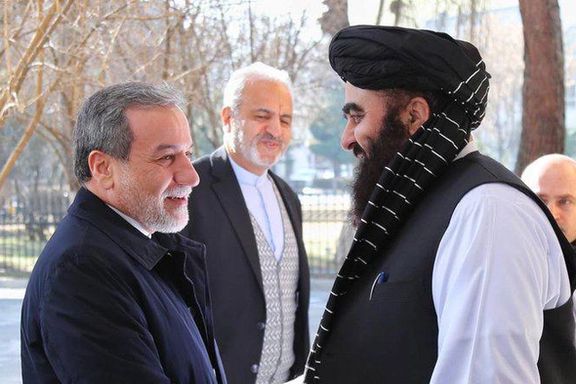
Iran's Foreign Minister Abbas Araghchi traveled to Kabul on Sunday to meet with leaders of the Taliban, the highest level delegation since their return to power in 2021.
IRGC-affiliated Fars News reported that Araghchi met with Mullah Mohammad Hassan Akhund, Taliban's prime minister, and Foreign Minister Amir Khan Muttaqi, during the visit.
The trip is highly significant, with key issues on the agenda including the status of Afghan migrants, water rights disputes, and shared security concerns.
According to Iranian media, the discussions are expected to culminate in a comprehensive cooperation agreement aimed at addressing these critical matters.
The visit has drawn criticism both within Iran and among Afghans. The Iranian newspaper Jomhouri Eslami argued that the trip grants the Taliban undue legitimacy, adding that "no country, including the Islamic Republic of Iran, recognizes them."
Countries including the US, UK and EU, continue to designate the Taliban a terrorist organization.
The paper said that recognition of any Afghan government by Iran is conditional upon holding elections and respecting the will of the Afghan people, which the Taliban have continued to reject, opting instead for a tribal, autocratic system.
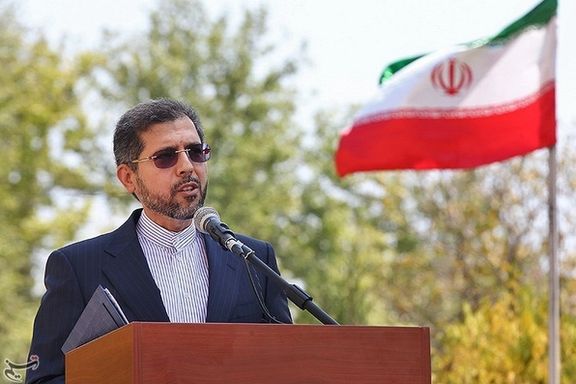
Saeed Khatibzadeh, a senior Iranian diplomat who helped mastermind Tehran's influence operations in the West, has been appointed head of the foreign ministry's think tank, the Institute for Political and International Studies (IPIS).
In 2023, a joint investigative report by Iran International and Semafor combed through thousands of emails from Iranian diplomats, revealing an Islamic Republic network of academics and think tank analysts established by the Iranian foreign ministry to extend Tehran's soft power.
Khatibzadeh, then a Berlin-based diplomat, was the one who proposed in 2014 the formation of the network - called the Iran Experts Initiative - according to the emails.
As a key member of the IPIS, he suggested to his superiors that by forming a network of Iranian analysts in “American and European think tanks”, and offering them “political support”, the Islamic Republic could promote its standpoint in the world.
Iranian former foreign minister Mohammad Javad Zarif had close ties to the IEI, delivered speeches at their gatherings, and communicated directly with some of its members.
Zarif reemerged in Iranian politics last year and was appointed Vice President for Strategic Affairs, hoping to champion new negotiations with world powers regarding Iran’s nuclear deal. Addressing the World Economic Forum in Davos, Zarif said on Wednesday that Iran hoped U.S. President Donald Trump would choose 'rationality' in his dealings with the Islamic Republic.
Khatibzadeh previously served as Iran's foreign ministry spokesman and ambassador to Croatia. His appointment as the head of the IPIS could provide significant firepower to the Zarif's campaign.
"Khatibzadeh played a role in the crafting of the "Iran Experts Initiative," which was used as a malign influence operation by the regime during the JCPOA negotiations in 2013-15. His appointment signals a likely return of similar efforts during the Trump era," said Jason Brodsky, the policy director of the US-based advocacy group United Against Nuclear Iran (UANI).
The mastermind
Iranian foreign ministry emails showed that Khatibzadeh was the mastermind behind the formation of the IEI.
He wrote in an email on March 5, 2014 to Majid Takht-Ravanchi, one of the leading Iranian nuclear negotiators, and Mostafa Zahrani, the then head of the IPIS in Tehran: “This initiative which we call ‘Iran Experts Initiative (IEI)’ is consisted of a core group of 6-10 distinguished second-generation Iranians who have established affiliation with the leading international think-tanks and academic institutions, mainly in Europe and the US.”
On April 14, 2015, Khatibzadeh emailed Zahrani a list of articles and interviews that members of the IEI had published in support of Iran's stance in nuclear negotiations, including Ali Vaez, Ariane Tabatabai, Dina Esfandiary, Ellie Geranmayeh, Adnan Tabatabai, and Rouzbeh Parsi.
Khatibzadeh outlined his accomplishments in an email in 2016, emphasizing his endeavors to “build a network and … engage with think tanks, with a clear focus on the nuclear negotiations to advance Iran's foreign policy, at the highest level” and to “publish dozens of articles in line with” Iran’s foreign policy.
The Iran Experts Initiative (IEI) was “one of the fundamental initiatives of the IPIS”, according to Zahrani. Now, the entity will be run by Khatibzadeh, the mastermind of the Islamic Republic's efforts to influence US foreign policy.
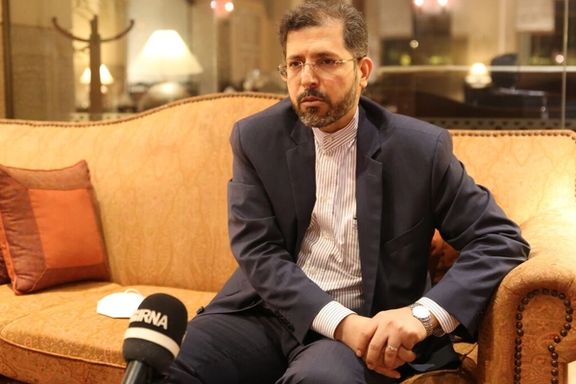
Tabatabai's case
Iran International's 2023 revelations sparked widespread controversy in US political circles, particularly regarding Ariane Tabatabai, a former key aide to former US Special Envoy for Iran, Robert Malley, whose own ties to Tehran were later detailed in a February 2024 investigation by Iran International.
In 2023, Tabatabai was serving as the Pentagon Chief of Staff for the Assistant Secretary of Defense for Special Operations and Low-Intensity Conflict and retained her role and security clearance despite the revelations.
The report prompted multiple congressional investigations, with Republicans raising concerns about her ability to obtain a top-secret security clearance. The Pentagon and State Department said there was nothing in Tabatabai’s background that would have disqualified her from accessing classified information.
In October 2024, she took on a new role in the defense department, which gave her reduced access to intelligence. The Iranian-American academic started overseeing force education and training within former Defense Secretary Lloyd Austin's office.
She left the role this month, according to her LinkedIn profile.
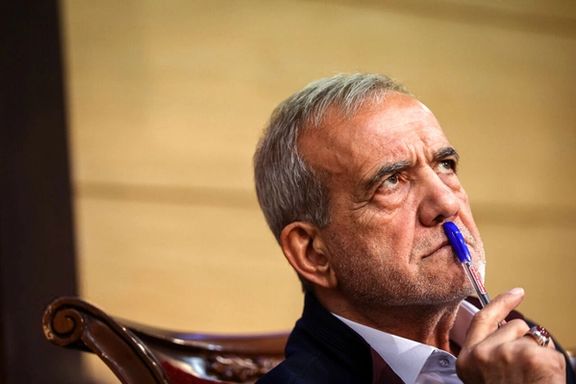
Iran's relatively moderate president, Masoud Pezeshkian, has no plan to run for a reelection in 2028, a reformist newspaper reported on Saturday.
"Masoud Pezeshkian has said in the inner circles of power that he will serve only one term as president and does not intend to run in the next presidential election," pro-government Sazandegi newspaper reported, without giving further details.
The report was released shortly after Pezeshkian and one of his vice presidents posed for photos dressed as construction workers while laying bricks for the construction of a school in Khuzestan, southwestern Iran.
Sazandegi praised Pezeshkian’s brick-laying gesture as "beautiful", but many social media users, including both conservatives supporting the Islamic Republic and dissidents, criticized it as populism.
"The exchange rate for every US dollar has soared to 838,000 rials, and the president is busy shoveling dirt and cement," one user on X quipped.
Another anonymous user, a cleric, commented, "If the previous ultraconservative President (Mahmoud) Ahmadinejad had done the same, the media would have criticized him with all kinds of harsh words."
However, in its Saturday report, Sazandegi countered that the gesture could not be considered populist, as Pezeshkian has no intention of running for reelection.
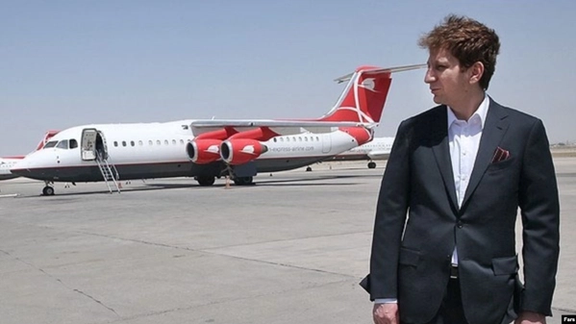
Unofficial reports surrounding the activities of Babak Zanjani, once Iran's richest man and a figure synonymous with corruption and sanctions evasion, have reignited public and media interest.
Recent reports in Iranian media suggest that Zanjani, despite being officially incarcerated, may be laying the groundwork for ambitious economic projects, including ventures in cryptocurrency, aviation, and oil transport.
The conservative Khorasan daily recently questioned reports about Zanjani's involvement in launching a cryptocurrency bank named Bit Bank. Social media users have said that a sign bearing the bank's name has been spotted on a building in Tehran, fueling speculation about Zanjani's return to economic activities.
"Are the claims regarding Babak Zanjani's new activities true? If so, will he be released from prison, granted conditional freedom as previously mentioned by his lawyer, or will he launch a new round of economic activities from inside prison?" Khorasan asked in a recent editorial.
A video uploaded to a YouTube account in December attributed to Zanjani detailed plans for a blockchain-based economic initiative, describing Iran's economy as fertile ground for such innovations.
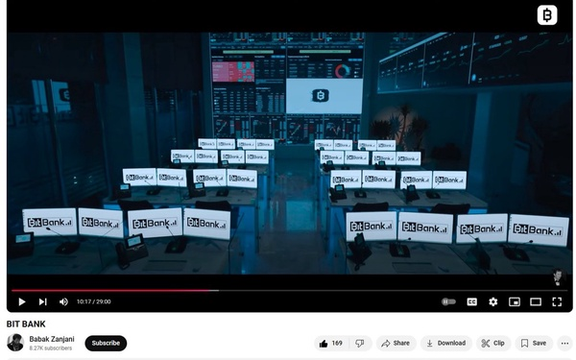
The timing of these activities raises eyebrows, given the Trump administration’s potential return to a maximum pressure policy against Iran. Cryptocurrency, particularly projects pegged to stable assets like the dollar, could serve as a tool for evading sanctions. However, no concrete evidence links Zanjani directly to these developments beyond the circulating social media claims.
Adding to the intrigue are notes attributed to Zanjani on social media suggesting the establishment of an airline, Dot One, which promises to transform Iran's aviation industry.
Another report said that Zanjani intends to launch a large-scale oil transport operation involving thousands of tanker trucks. While the authenticity of these statements remains uncertain, the ambitious tone mirrors the bold projects Zanjani was associated with during his heyday.
Conservative media outlets in Iran have called on judiciary officials to clarify Zanjani’s legal and operational status.
In response to speculation about Zanjani’s release from prison, judiciary spokesperson Asghar Jahangir earlier said: "Babak Zanjani has neither been released nor is he on leave." The official said that no recent developments support claims of Zanjani’s release.
Nevertheless, Zanjani’s lawyer, Rasoul Kouhpayeizadeh, fueled speculation by posting a photo on Instagram showing Zanjani with an individual dressed as someone from a Persian Gulf Arab country, tagged at a location in Tehran. The post’s ambiguous nature has only added to the mystery surrounding Zanjani’s exact status and whereabouts.
A Legacy of Controversy
Zanjani’s rise and fall remain one of the most contentious episodes in Iran’s recent economic history. Once valued at $13.5 billion, Zanjani was seen as a key player in circumventing sanctions under President Mahmoud Ahmadinejad. His networks laundered billions through complex schemes spanning Turkey, Indonesia, and Central Asia. Arrested in Iran in 2013, Zanjani was convicted of embezzling $1.9 billion in oil revenues, earning him a death sentence later commuted to 20 years in prison. The government charged that he pocketed money from oil exports insted of returning it to the treasury.
While some officials have praised Zanjani for eventually returning the assets, many argue that his extensive operations were enabled by high-level complicity. The secrecy surrounding his dealings and cooperation with authorities have led many to view him as a figure too well-connected to face the full consequences of his actions.
Zanjani's resurgence coincides with Iran’s ongoing economic crisis. As sanctions persist, limiting oil exports and access to international banking, the government struggles with budget deficits and hyperinflation. Cryptocurrency projects and privatized oil transport ventures, if materialized, could offer alternative revenue streams for Iran’s beleaguered economy.
Yet, the ambiguity surrounding Zanjani’s activities and the lack of official acknowledgment leave more questions than answers.